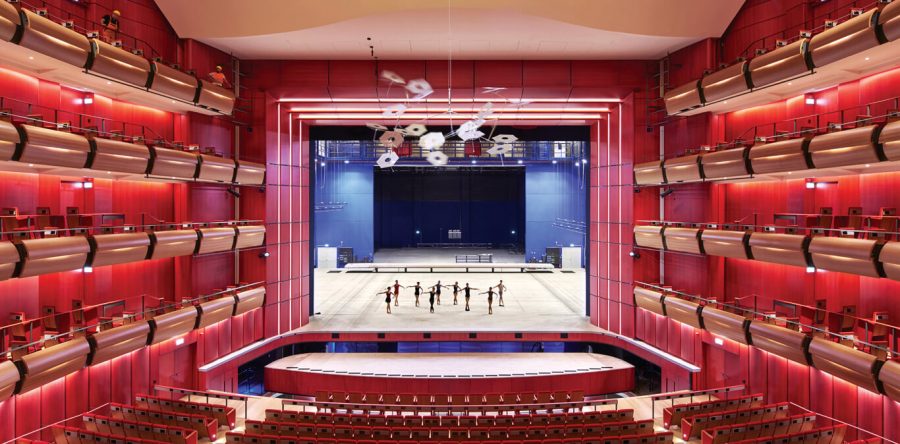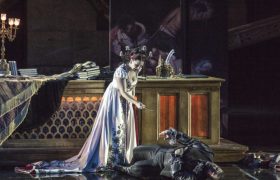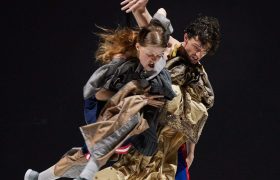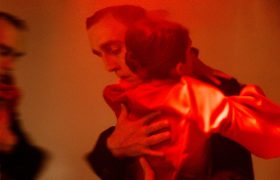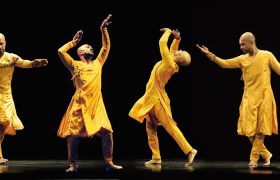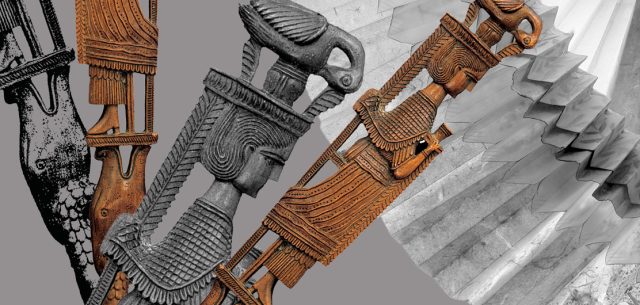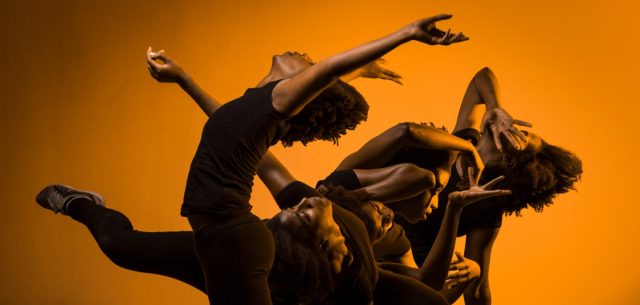Giorgos Koumendakis leads the Greek National Opera into an extraordinary new era
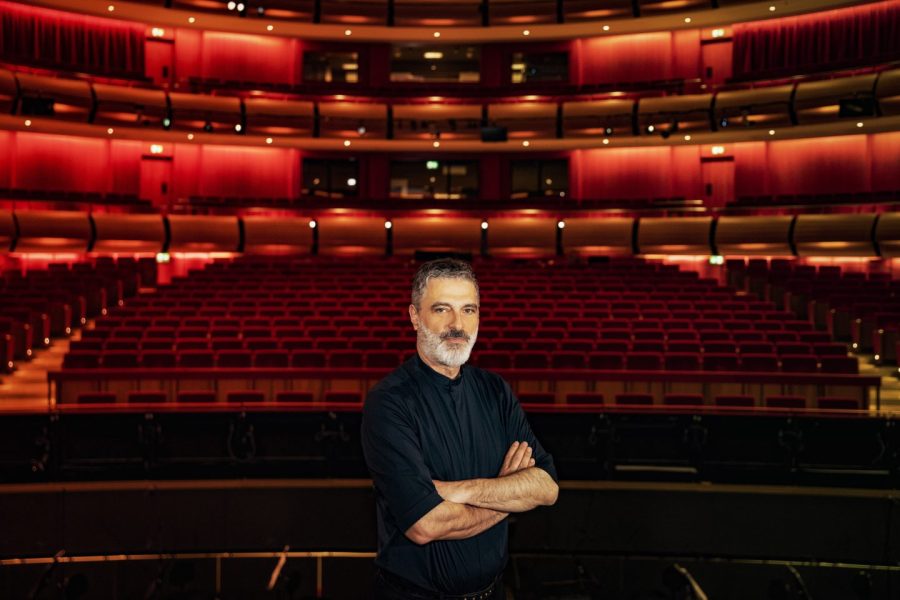
One of the most remarkable operatic success stories of the past decade has been the meteoric rise in quality and status of the Greek National Opera. Since its move to its new theatre at the impressive Stavros Niarchos Foundation Cultural Centre, (SNFCC, which also houses the National Library, both in spectacular, subtly lit buildings by Renzo Piano), under an entirely new Artistic and Administrative team in 2017, it has become a universally admired and respected European cultural institution. Most important, the average age of its audience is now between 35-40, as opposed to over 60 before. Helena Matheopoulos speaks to Giorgos Koumendakis, GNO’s visionary Artistic Director who is helming the change at the GNO.
The man responsible for this transformation is its Artistic Director Giorgos Koumendakis, one o Greece’s top and most prolific composers of over 170 works (many of which are performed internationally), and responsible for the music of the Opening and Closing Ceremonies of the 2004 Athens Olympic Games. He had already been offered, and refused, the post of Artistic Director of GNO twice before, from parties at both ends of the political spectrum, while the Company was still in its old theatre in a converted cinema with limited stage facilities and potential. “But this time I accepted because of the certainty that conditions at the GNO’s new premises would enable me to develop an important, completely different creative environment.”
When I took over, I looked at opera spherically, and thought about how an organization such as ours could develop within these new premises in original, imaginative ways. I was not satisfied with the repertoire, which I considered limited and monotonous. I love belcanto and verismo very much, but they shouldn’t monopolize our entire programming. Also, I looked not only at opera, but at anything within the spirit and framework of music theatre in general, as well as how this can exist in conjunction with all the other arts.
“Then I had to consider the social and educational aspects, part and parcel of the contribution expected from an Organization such as the GNO, subsidized by the Ministry of Culture of successive governments. As there was no organized system designed to produce new artists or new audiences, I had to create one, and turn the previous Alternative Stage into an independent section within the GNO which, I am happy to say, has blossomed in an incredible way. So this was the general plan: Opera and music at the centre, with a simultaneous expansion into all the arts, plus social and educational work.”
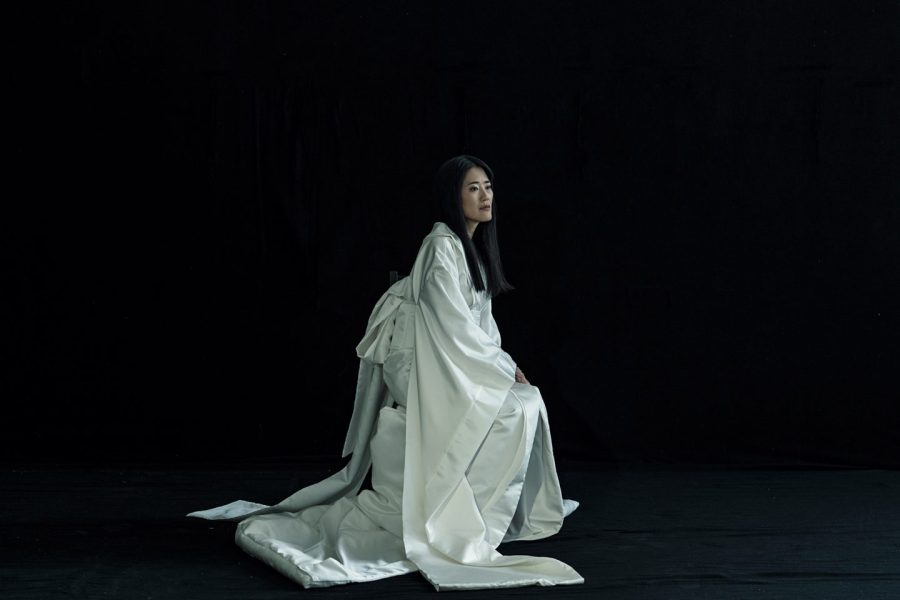
Korean soprano Anna Sohn performs the lead role in Puccini’s Madama Butterfly at the Herod Atticus in early June. Conducted by Vassilis Christopoulos and directed by Olivier Py. Photo by A. Simopoulos/ GNO
Even within the first two and-a-half years there, the performance quality had already risen to international standards, the repertoire had become an exciting mix of popular classics and rarities (for the Greek public), while the buzz created by new commissions and the experimental work carried out in its second “Alternative” stage, (the Enallaktiki Skini), engaged the plentiful local talents into a zestful creative participation in the world of opera. Major international artists, such as Fanny Ardant had begun to be invited and composers new to the Greek public, such as Janacek, were introduced.
In recognition of its satisfaction with the quality of the GNO’s creative output during the first two seasons at the SNFCC, the Stavros Niarchos Foundation, stepped in with a further grant of a 20 million euros at the beginning of the third season. This enabled the Company to enter “a new phase” in its artistic programming and a systematic drive towards the international exposure and promotion which the quality of its work now deserved: directors such as Olivier Py for Wozzeck and Robert Wilson for a controversial Otello, began to invited, followed by commissions – such as a short film titled The Artist on the Composer by Award-winning film director Yorgos Lanthimos – and participation in a co-productions such as Marina Abramovic’s “The Seven Deaths of Maria Callas, with the Bavarian State Opera, Berlin’s Deutsche Oper, Maggio Musicale Fiorentino, The Teatro San Carlo and the Paris Opera.
“Then, after the pandemic (during which we managed to stream live productions of Don Giovanni and Andrea Chenier), “we had Inland, a new opera written especially for singers from our learning and participation programmes, amateurs aged over 65, chosen after auditioning retired soloists and choristers all over Greece, plus some members of our own chorus and orchestra. This linked our own output and our social and educational contribution into an indistinguishable whole. The standard was such, that you couldn’t distinguish the amateurs from the professionals!”
“So now, six years later, I am happy to say that almost all my initial aims have been achieved. GNO has a place among Europe’s top ten opera houses, collaborates in co productions with the world’s greatest theatres and is internationally respected and admired. Great artists are a regular feature at GNO, and we have also built a company of good Greek singers under permanent contract.” The superb double bill of Bluebeard’s Castle paired with Gianni Schicchi bears witness to this and deserves to travel far.
This season also featured a series of major international co productions with top opera houses and festivals. Don Giovanni with Goeteborg Opera and Danish Royal Opera; Kryzsztof Warlikovski’s Les Contes d’ Hoffmann with Theatre de la Monnaie in Brussels; Philip Langridge’s production of Falstaff from Glyndebourne Festival and David Mc Vicar’s sublime production of Cherubini’s Medea, co-produced with the Metropolitan Opera, Chicago Lyric Opera and Canadian Opera and dedicated to Maria Callas on the 100th anniversary of her birth. Coming soon, the start of a regular collaboration with the Opera Comique in Paris with a staging of Offenbach’s Voyage a la Lune by Laurent Pelly’.
When I first interviewed Koumendakis three years ago, he had begun to experience “occasional joys and this feeds me inside”. So how dies he feel now, after the giant strides of the past two seasons? “Now I have the satisfaction of knowing that I have created a solid system on which GNO can continue to thrive after my eventual departure, as well as a stock of a wide variety of works that would enable it to survive in difficult times for years, just on revivals of existing productions.”
For the GNO’s detailed programme, visit here

